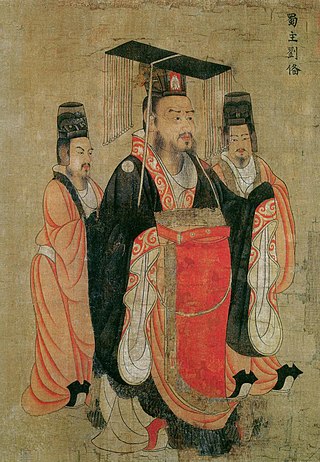
Liu Bei, courtesy name Xuande (玄德), was a Chinese warlord in the late Eastern Han dynasty who later became the founding emperor of Shu Han, one of the Three Kingdoms of China. Although he was a distant relative of the Han imperial family, Liu Bei's father died when he was a child and left his family impoverished. To help his mother, he sold shoes and straw mats. When he reached the age of fifteen, his mother sent him to study under Lu Zhi. In his youth, Liu Bei was known as ambitious and charismatic. He gathered a militia army to fight the Yellow Turbans. Liu Bei fought bravely in many battles and grew famous for his exploits. Later, he participated in the coalition against Dong Zhuo, following this joined his childhood friend Gongsun Zan and fought under him against Yuan Shao.

Zhang Fei, courtesy name Yide, was a military general serving under the warlord Liu Bei in the late Eastern Han dynasty and early Three Kingdoms period of China. Zhang Fei and Guan Yu, who were among the earliest to join Liu Bei, shared a brotherly relationship with their lord and accompanied him on most of his early exploits. Zhang Fei fought in various battles on Liu Bei's side, including the Red Cliffs campaign (208–209), takeover of Yi Province (212–214), and Hanzhong Campaign (217–218). He was assassinated by his subordinates in 221 after serving for only a few months in the state of Shu Han, which was founded by Liu Bei earlier that year.

Pang Tong (179–214), courtesy name Shiyuan, was a Chinese politician who served as the key adviser to the warlord Liu Bei in the late Eastern Han dynasty of China. In his youth, Pang Tong was disregarded because he was plain looking, however Sima Hui highly esteemed him calling him the "Crown of Scholars in Jing Province". He studied under him along with Zhuge Liang, Xu Shu and Xiang Lang and was given the nickname of "Fledgling Phoenix". Because of his friendly attitude, he worked as an appraiser in Nan Commandery. When reviewing someone, he would prioritize their virtue over their abilities and would encourage them to help others.

Fa Zheng (176–220), courtesy name Xiaozhi, was a key adviser to the warlord Liu Bei in the late Eastern Han dynasty. Born in a family of high social status and of noble descent, Fa Zheng travelled to Yi Province in the late 190s and became a subordinate of Liu Zhang, the provincial governor. However, his feelings of alienation and perception of Liu Zhang as an incompetent governor eventually led him to betray Liu Zhang and defect to Liu Bei in 211. Between 211 and 214, Fa Zheng assisted Liu Bei in overcoming Liu Zhang and seizing control of Yi Province, and became one of Liu Bei's most trusted advisers. In 217, he urged Liu Bei to launch the Hanzhong Campaign to capture the strategic Hanzhong Commandery from a rival warlord, Cao Cao, but died a year after Liu emerged victorious in the campaign.
Zhang Yi, courtesy name Junsi, was an official of the state of Shu Han in the Three Kingdoms period of China.
Huang Quan, courtesy name Gongheng, was a military general of the state of Cao Wei during the Three Kingdoms period of China. He previously served under the warlords Liu Zhang and Liu Bei during the late Eastern Han dynasty and in the state of Shu Han during the early Three Kingdoms period before defecting to Cao Wei. Liu Bei relied heavily on Huang Quan for counsel in both domestic and foreign policy. Under the Wei government, however, Huang Quan was restricted to only internal affairs because even though the Wei emperor Cao Pi appreciated him for his talent, he doubted Huang Quan's allegiance and believed he was still secretly loyal to Liu Bei.
Li Hui, courtesy name De'ang, was an official of the state of Shu Han during the Three Kingdoms period of China. After refusing Liu Zhang's service, Li joined Liu Bei early in his campaign to pacify Yi province. After Liu Bei's death, Li Hui proved his talents during Zhuge Liang's Southern Campaign and was appointed the area commander in the south. He set the standard for his successors, such as Ma Zhong, for sound governance. After Shu-Han's co-regent Li Yan was removed from office, Li Hui was promoted again and sent to Hanzhong to assist in the Northern Expeditions but died a year later.
Fei Shi, courtesy name Gongju, was an official of the state of Shu Han during the Three Kingdoms period of China.

Dong Yun, courtesy name Xiuzhao, was a Chinese general and politician of the state of Shu Han during the Three Kingdoms period of China. His father, Dong He, also served as an official in Shu. Dong Yun was one of four persons who held positions equivalent to a head of government in Shu from 221 to 253; the other three were Zhuge Liang, Jiang Wan and Fei Yi.

Zhang Song (died January or February 213, courtesy name Ziqiao, was an official and adviser serving under the warlord Liu Zhang during the late Eastern Han dynasty of China.

Ma Zhong, courtesy name Dexin, originally named Hu Du, was a military general of the state of Shu Han during the Three Kingdoms period of China. Liu Bei was quite impressed by Ma Zhong and praised him highly, comparing him to the recently defected Huang Quan, Ma Zhong was trusted and respected by the following head of the government Zhuge Liang, Jiang Wan and Fei Yi. After Liu Bei's death, he served under Zhuge Liang during the Southern Campaign and helped to quell the rebellion. He was appointed as the area commander in the south after Li Hui's death. He spends most of his life pacify the region and protecting the people of the south often with the help of Zhang Ni. Ma Zhong was known as a generous and whimsical man but he was also decisive in handling affairs. Hence the southern tribes both feared him and respected him. His duty in the south could be comparable to Wang Ping in the north and Deng Zhi in the east. After his death, the foreigners sorely missed him and later established a temple in his honor.
Liu Bei's takeover of Yi Province was a military campaign by the warlord Liu Bei in taking control of Yi Province from the provincial governor, Liu Zhang. The campaign took place between the years 211 and 214 in the late Eastern Han dynasty; although the conflict between Liu Bei and Liu Zhang started in January or February 213 when the latter discovered the former secret communications and subsequently executed Zhang Song. It concluded with victory for Liu Bei and his successful takeover of the province from Liu Zhang in July 214. Yi Province would serve as the foundation of the state of Shu Han during the Three Kingdoms period.

Xiang Chǒng was a military officer of the state of Shu Han during the Three Kingdoms period of China. In the Chu Shi Biao, Zhuge Liang named Xiang Chong as a capable subject of good character and someone well-versed in military affairs, and urged Liu Shan to put Xiang Chong's talents to good use. He was a nephew of the Shu scholar Xiang Lang.

Lu Ji (188–219), courtesy name Gongji, was a Chinese politician and scholar serving under the warlord Sun Quan in the late Eastern Han dynasty of China. He was also one of the 24 Filial Exemplars.
Meng Guang, courtesy name Xiaoyu, was an official and scholar of the state of Shu Han in the Three Kingdoms period of China.
Zhou Qun, courtesy name Zhongzhi, was an official, astronomer and diviner who served under the warlords Liu Zhang and Liu Bei in the late Eastern Han dynasty of China. Two of his interpretations of comets are preserved in volumes 102–104 of the Book of the Later Han, presumably through quotation by Qiao Zhou.
Yang Xi, courtesy name Wenran, was an official of the state of Shu Han during the Three Kingdoms period of China. He is best known for writing the Ji Han Fuchen Zan, a collection of praises of notable persons who served in the Shu Han state. Chen Shou, the third-century historian who wrote the Records of the Three Kingdoms (Sanguozhi), extensively quoted and annotated Yang Xi's collection.

Dong He, courtesy name Youzai, was an official in the state of Shu Han during the Three Kingdoms period of China. He originally served under the warlord Liu Zhang before becoming a subordinate of Liu Bei after Liu Zhang's surrender to Liu Bei in 214. Where he would serve in Liu Bei's office alongside Zhuge Liang until his death seven years later. He was known for his frugality and virtue which earned him the admiration of the people of the land of Shu.

Yang Hong, courtesy name Jixiu, was an official of the state of Shu Han during the Three Kingdoms period of China.
She Yuan, courtesy name Wenxiong, was an official of the state of Shu Han in the Three Kingdoms period of China. She Yuan was among the 11 recorded officers of Liu Bei who persuaded him to declare himself "King of Hanzhong" (漢中王).











